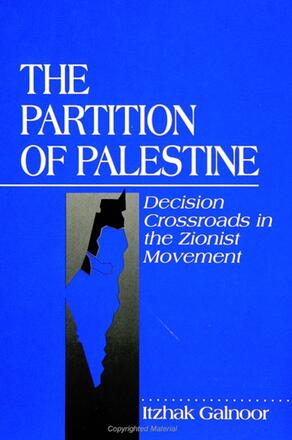
The Partition of Palestine
Decision Crossroads in the Zionist Movement
Alternative formats available from:
Description
Some seventy-five years after the boundaries of the British Mandate for Palestine were set, the State of Israel still lacks a defined territory and agreed-upon boundaries, except for its boundary with Egypt. This book examines this unusual situation, concentrating especially on the perceptions of territory and boundaries within the Zionist movement.
Galnoor discusses the period from the first territorial decision in 1919 up to the establishment of the State of Israel in 1948, placing special emphasis on the relatively unknown Zionist, Palestinian, and Arab positions regarding territorial partition in 1937. And he argues that although dramatic changes have occurred in the international and regional arena, the partners to the conflict, the security considerations, and the international dilemmas, the 1937 decision contained the parameters of the choices that have confronted Arab and Israeli leaders ever since. His findings are of direct relevance to the ongoing Arab-Israeli peace negotiations, which once again revolve around the trade-off between national goals and territorial aspirations.
Itzhak Galnoor is Professor of Political Science at the Hebrew University of Jerusalem and editor of the Eshkolot Library, a book series on society and politics in Israel. He was awarded the Naftali Prize in Social Sciences in 1987 for his book Steering the Polity—Communications and Politics in Israel.
Reviews
"The merits of this study are of an uncommon order. It is an impressive use of rich historical materials by a political scientist to clarify crucial concepts — state, nation, territory, sovereignty, boundaries — and to probe fundamental issues. Galnoor examines the relative importance of geography and politics, pragmatism and ideology, in the choice among options on a fateful issue that is suffused with passion; the decision process; coalition-building; and the role of perceptions and attitudes in political behavior, in this case a turning point vote by a national movement. It is a highly analytical work, with a well-articulated framework and clearly defined categories, concepts, and research questions." — Michael Brecher, McGill University
"I found this book fascinating. As I read, I was constantly discussing it with those around me. It illuminated the history of the Arab-Israeli conflict from a perspective I had not thought much about." — Joel S. Migdal, University of Washington